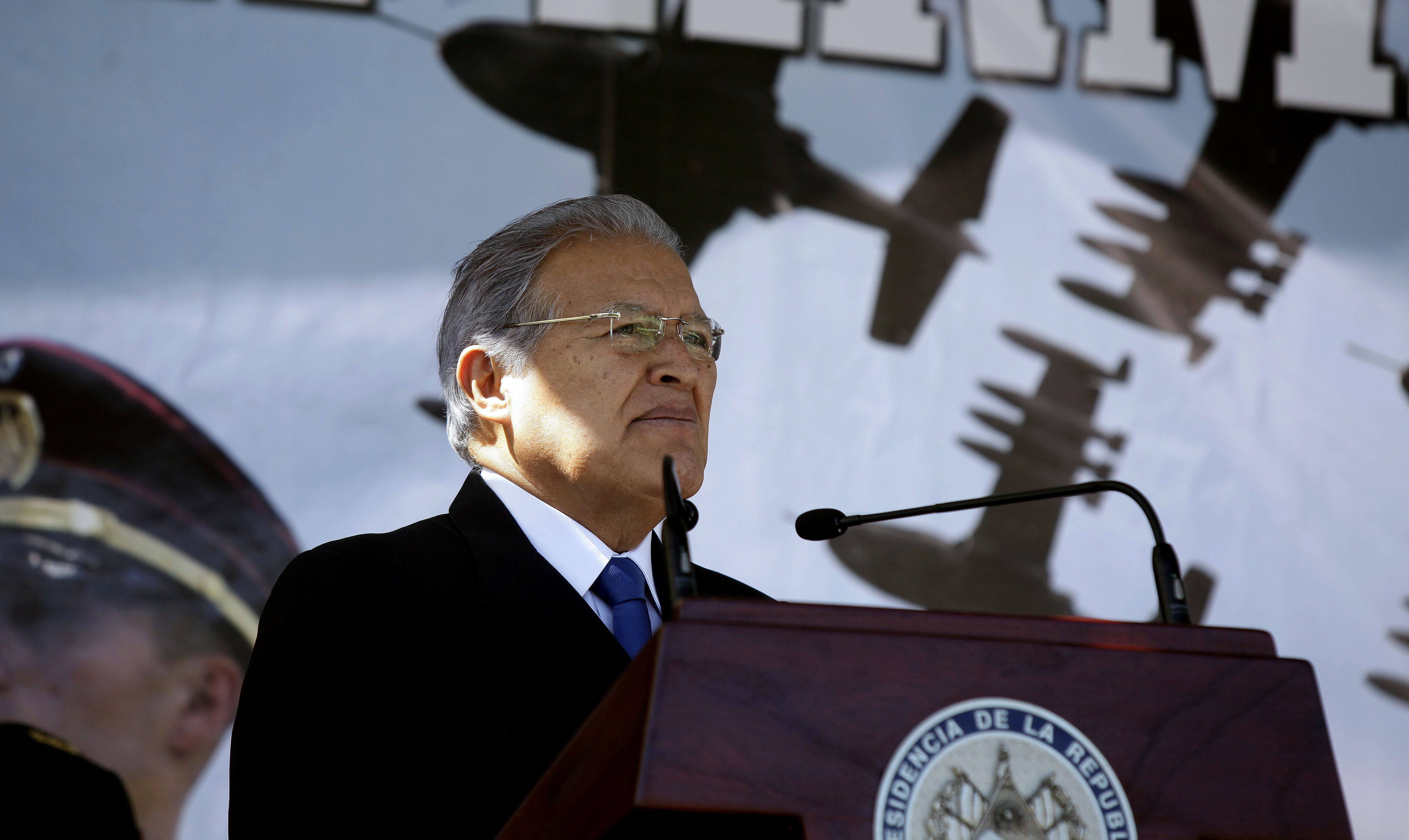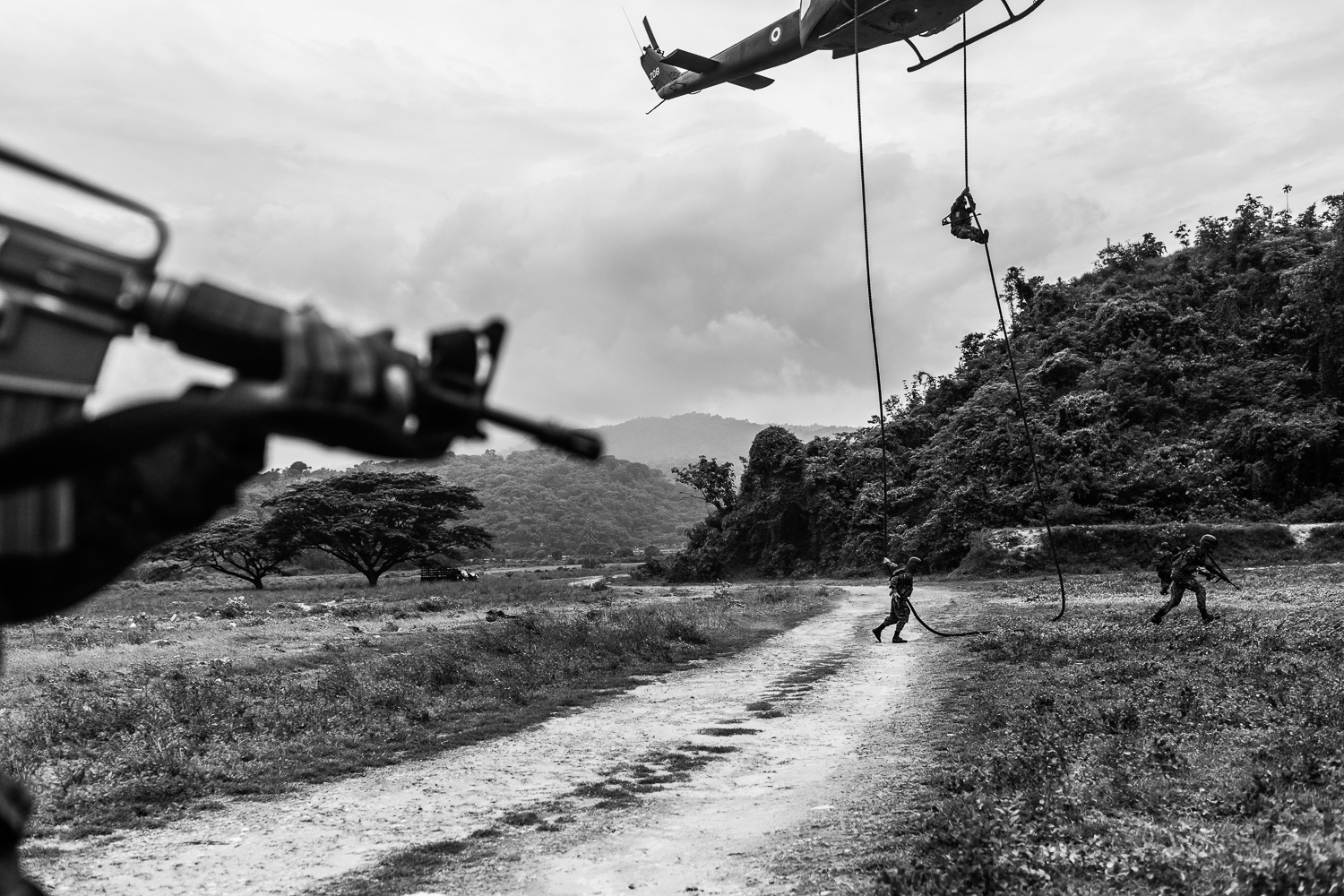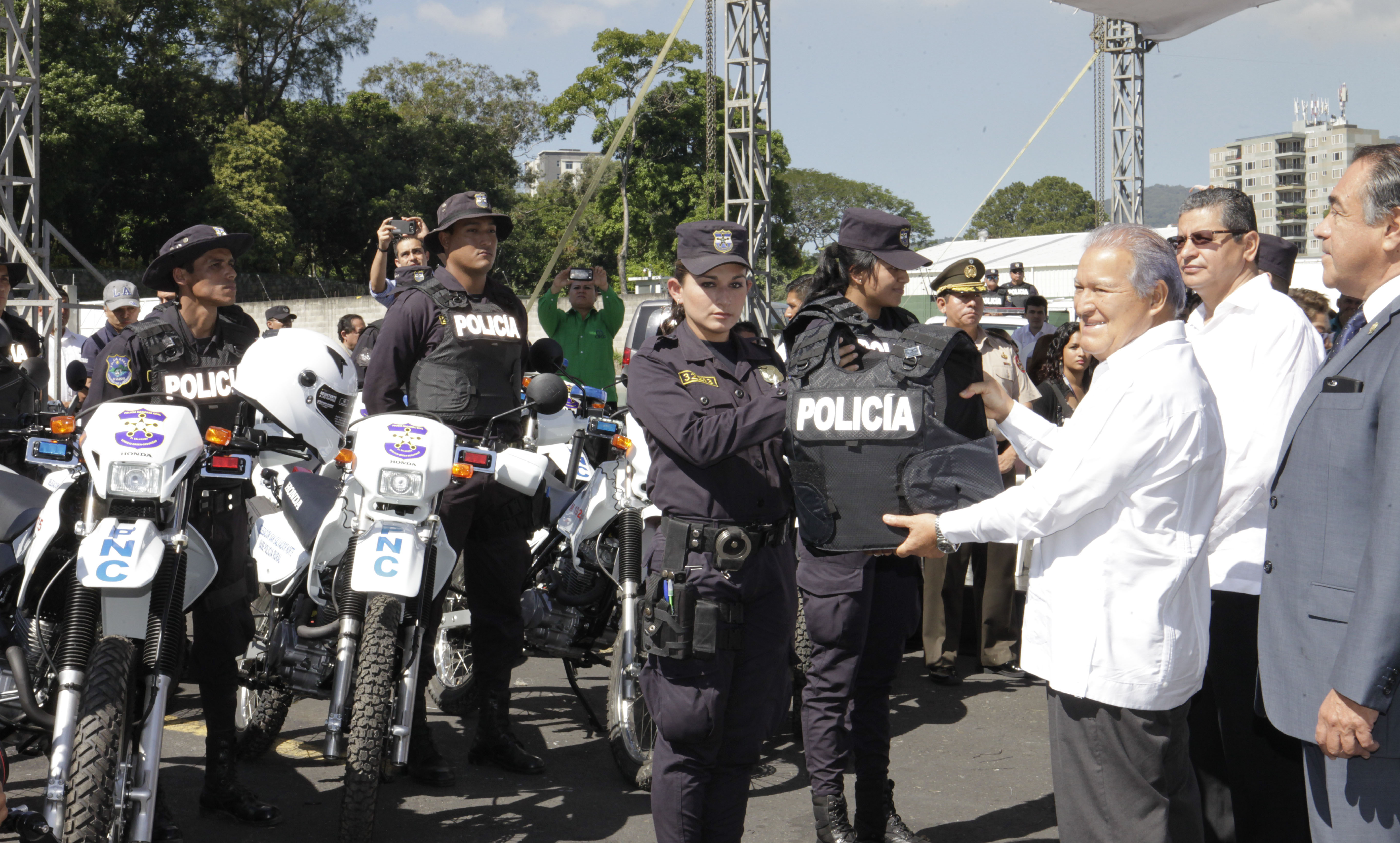Author: Sarah Kinosian
Editor’s Note: We recently took a look at gangs and organized crime in El Salvador. But, with the open and ongoing conflict between security forces and gangs, how government security forces are impacting the population is also critical to examine. This article is the second in this series on violence in El Salvador.
The government’s use of force has invited violent pushback from the gangs, and there have been severe consequences for citizens living in the crossfire. All sides are now engaged in an escalating cycle of action and reaction. For security forces, it seems the line between those living in gang-controlled neighborhoods and those in a gang has become blurred, casting such a wide net in their operations that anyone could be targeted, but particularly young boys.
Police and Military vs. Gangs: War, Extrajudicial Killings, and Death Squads

|
President Salvador Sánchez Cerén was elected on a pledge to take on the gangs. Since taking power, he has overseen an overall policy shift to outgun them. In a scramble to address the violence, the Salvadoran government has created anti-gang battalions and increased police raids, spearheaded by a unit called the Reaction Police Group, which has been linked to deaths and enforced disappearances of alleged gang members. The government has deployed over 7,000 soldiers and thousands of police officers to the streets.
Among the forces deployed are elite groups such as: Los Halcones (The Hawks), the police’s Fast Response Corps; the New Reaction Special Forces, an elite army unit created last year to battle the gangs; the Hacha command, part of the Salvadoran Armed Forces Special Operations Group that has been trained in the United States to advise police in Iraq and Afghanistan; the “Zeus” command, a military force of 2,821 members divided into nine task forces and deployed to 42 of the country’s most violent municipalities to patrol with police; the “Águila” command, which has deployed 2,000 troops to 1,063 schools; the “Sumpul and” “San Carlos” commands; and the military’s mobile rapid response special force “Trueno,” or “Thunder,” which is “supported by helicopters and ground vehicles, for situations requiring an armed response beyond that available from local military and police forces,” according to security blog War on the Rocks.

|
Part of the government’s increasingly hardline approach is in response to a shift in gang strategy. Starting in 2014, the gangs began specifically targeting police, killing over 30 officers that year. With the surge in police operations, the overall trend towards more violent confrontations has grown. In 2015, gang members killed just over 60 police officers and nearly 20 soldiers. Because of the heightened dangers on top of extremely low salaries, more police are quitting – some 350 police officers resigned in 2015, a 49 percent increase on the previous year. An organized crime specialist in the country told us that the gangs now have formed “comandos de barrios” that are like gang special forces units that carry out “disappear and bury” operations, targeting police and military.
Escalating the violence, Salvadoran lawmakers and officials have encouraged police to take a harder swing at the gangs.
In 2014, changes to the country’s penal code (articles 300, 323-A, and 350) made it harder for police and military involved in shootings of gang members to be prosecuted effectively for abuses, according to a former vice minister of security. A police directive that followed these changes in 2015 essentially gave officers the green light to shoot alleged gang members without fear of investigation. Speaking at a press conference in late January 2015, then-Police Director and recently-named Minister of Public Security and Justice Mauricio Ramirez Landaverde said: “All members of the [National Civil Police (PNC)] that have to use weapons against criminals due to their work as officers, should do so with complete confidence. There is an institution that backs us. There is a government that supports us.” As a humanitarian worker who has worked on the ground for 10 years and previously worked with USAID told us, “This has perpetuated the mentality that the life of a police officer is worth more than the life of a gang member in El Salvador, and that is a dangerous message.”
Adding fuel to the fire, in August 2015, the then-attorney general Luis Martínez began prosecuting gang members as terrorists under El Salvador’s existing Special Law Against Acts of Terrorism. Terrorism charges can carry prison terms from 40 to 60 years for those found guilty of “an act against the life, personal integrity, liberty, or security” of a public official or employee, while homicide carries up to 20 years, and aggravated homicide up to 50 years.
Lawyers, judges, and security analysts we spoke with said the special law was more about sending a message, both to the gangs and the public, about its “zero-tolerance” stance on the gangs than changing prosecution proceedings. They also noted that as much as it further encouraged security forces to view all alleged gang members as enemies in a war, it could also have the effect of radicalizing the gangs. As one judge, an alternate for the Supreme Court, noted: “it could, and will likely push gang members to assume the attitude of ‘well, I’m already considered a terrorist, so I might as well act like one.’”
In a disturbing example of the dangers presented by labeling gangs as terrorists, a top Salvadoran police official called for newspaper El Diario de Hoy to be tried on terrorism charges after publishing several stories on the gangs, including one article about police corruption claiming that “the police do not escape gang control. In fact, they may be the most controlled.”

|
This overall hardline approach to security has led to an increase in extrajudicial killings, most of which seem to be carried out by the police. As the investigative journalist explained, “Now a supposed fire exchange between security forces and gang members will leave all gang members dead and not one officer even wounded. This is suspicious.” The most emblematic case, documented and investigated masterfully in July 2015 by investigative news site El Faro, is that of San Blas, where police massacred eight people in March 2015. Five months later, in August, the officers implicated in the shootings were still on active duty and the then-director of the PNC said the officers had done nothing wrong. In January 2016, six months after El Faro published its investigation, the PNC and attorney general are still not effectively investigating the case.
“I don’t have the certain scientific evidence, but everything indicates to us that [security forces] are committing extrajudicial executions,” Dr. José Miguel Fortín Magaña, the former director of the Institute of Legal Medicine, the medical examiner’s office, told El Faro. Several sources told us that bodies of alleged gang members supposedly slain in combat had weapons placed on top of them— which, they said, clearly indicates these people were not killed in shoot-outs.
Neither human rights groups nor government officials could provide estimated numbers of extrajudicial executions. At this point these killings do not appear to be part of a systematic strategy throughout the force.
With the exception of the human rights ombudsman’s office, the government is quick to deny allegations of police wrongdoing. As Dr. Fortin explained in El Faro, “What are the comments when someone is doing an investigation that involves this government? They say that they [the investigators] were bought, that they are part of ARENA [opposition political party], that they are pro-gang… I don’t know how many other things. We are on the brink of hell.” However, investigations seem to be rare. As Dr. Fortín told the news site, “the problem is not that there are bad investigations, it is that there are not investigations.”
There is hope that this will change with the country’s newly-elected attorney general, Douglas Meléndez. Meléndez’s predecessor, the controversial Luis Martínez, has been accused of using illegal wiretaps, protecting drug kingpins, and purposefully mishandling a major corruption case against a former president. In December, the mayor of San Salvador threatened to leave the Farabundo Martí National Liberation Front (FMLN) party if the party’s deputies voted to re-elect Martínez. So far Meléndez, who has some significant convictions under his belt, has said all the right things: acknowledging allegations of corrupt elements within the attorney general’s office and pledging to focus on murder, extortion, corruption and transparency. He also recently signed an agreement with the United Nations Office on Drugs and Crime to establish a new initiative to fight corruption in El Salvador. Although it lacks the teeth of Guatemala’s international anti-corruption body, the CICIG, it is a sign things could be moving in the right direction.
However, the weakening of controls over the police and other security forces, the incentives to take a hardline approach, and the lack of adequate investigations, may be laying the groundwork for escalating extrajudicial executions and other abuses in the future. As the former Salvadoran vice security minister warned: “The police and army need to follow laws. It will be too late to rein them in if their actions aren’t dealt with now. They may become, and some could be becoming, illegal structures that the government cannot control.”
A Vigilante Resurgence
There is also growing concern over killings by illegal structures—what the Salvadoran media are calling “death squads.” These are groups of armed, masked men, dressed in clothes similar to police uniforms, dedicated to murdering alleged gang members. Those being targeted are gang members and those thought to be “sympathizers,” including family members and those pulled into gang operations against their will.
Human rights workers, security experts, a mid-level police commander, a former intelligence agent, journalists and the country’s human rights ombudsman all flagged reports about “death squads” operating in the country. One security analyst told us:
These groups are executing gang members and their families, carrying out several multiple homicides. It is not clear exactly who they are, but accounts from victims point to police and military tactics and many of them are often dressed in similar outfits to the police or army. So it is likely that current security force members are getting hired to carry out executions by the business community or politicians. It is also very possible that there are groups of civilians organizing themselves as social cleansing groups to take out the gangs.
Last January, an anonymous police source told Salvadoran newspaper La Página that these “death squads” had recently increased attacks against the gangs, although several had been operating in the country for over two years. A 2014 video can be seen here, allegedly from a group calling themselves “Los Lobos Negros,” or the Black Wolves, which claims to be made up of members from La Sombra Negra (the Black Shadow), the death squad that haunted the country in the mid-90s. Today, La Sombra Negra, or at least its name, seems to have made a resurgence, with a Facebook page that’s gathered nearly 15,000 likes; its most recent update this past January 5 read: “Feeling ready to exterminate.” The group also gives online classes and has its own website featuring pictures of heavily armed masked men and close-ups of gang members shot in the head. It is worth noting that the new subdirector of El Salvador’s national police (PNC), Flores Murillo, was indicted as a member of the Sombra Negra in 1995. For reasons that remain unclear, the charges against all those alleged to be involved were eventually dropped.
To date, there do not appear to be effective investigations into these structures. A November 2015 report from El Diario de Hoy examined 14 unsolved murders carried out in the “death squad style” and found that authorities had not investigated a single case. The PNC has pushed back on allegations of death squads, claiming the groups are made up of gang members themselves. In an interview with online news site Contra Punto on January 11, Human Rights Ombudsman David Morales responded, saying: “Here what is happening is a dysfunction of the PNC, in my opinion, the internal control mechanism and units have to go out and investigate the possible participation of police in these type of acts.”
Morales said his office was planning to investigate the “death squad” trend, although as human rights ombudsman his office cannot bring criminal charges. He cautioned that “it is very difficult to investigate these crimes, especially because most families immediately flee in fear. So those who carried out the crimes are never found and those who planned it never investigated.” Whether the new attorney general vigorously investigates these shadowy structures as well as incidents of alleged extrajudicial executions by police and military will be an important measure of his effectiveness.
Police and Military vs. Population: Abuses and Guilt by Association
One analyst and activist who has worked in gang-controlled communities for over 15 years described police interaction in some marginalized communities:
Police will open fire in the community because they’re at war. These are ripe conditions for police abuse; people expect to be physically assaulted by the police. It is routine for the police to beat people up, to break down doors, to verbally and sexually harass, to threaten people’s lives, to carry out arbitrary arrests. No one bothers to register this, only when it is killing, and even that is only sometimes. Since police can arbitrarily detain young people who look like gang members or trans women or not-quite-legal street sellers, no one wants to complain.
“The worst situation of life here is to be a young, poor boy. There is no guarantee you won’t be killed now. The police are criminalizing poverty. They are creating a generation of resentful youth,” explained a human rights defender in a gang-controlled neighborhood in San Salvador. A development worker in another neighborhood explained that even trying to help residents in these areas is becoming difficult: “The police now see even working with the community as working with the enemy. This has made our work this year very hard.”

|
Problems with the government’s use of force also extend to the military as it is increasingly being used for law enforcement. While police are supposed to be in charge in joint military-police actions in neighborhoods, we heard reports of soldiers acting without police supervision from several interviewees that work in crime-heavy neighborhoods. There appears to be insufficient oversight of these military operations and cases of abuse are rarely investigated. According to LGBTI rights group COMCAVIS TRANS, members of the organization caught soldiers allegedly raping a 13-year-old girl with Down syndrome, but when they attempted to report the crime, police officers refused to take their testimony.
In February 2014, five soldiers and a sergeant allegedly took three young men from a neighborhood in the town of Armenia controlled by one gang into the territory of another gang. The three young men never returned. When their families searched for their sons, they received threats and their houses were searched by the authorities. This well-publicized case has advanced in the courts, but many other disappearances remain unsolved. According to human rights groups, there are many threats against those involved in cases involving state actors. We commonly heard: “it is a risk to say anything.”
According to the founder of an organization investigating extrajudicial executions, “While the gangs are responsible for most of the murders, more and more state actors are involved in homicides and disappearances. They aren’t systematic, but they are there, and we are worried they could become more systematic, but the government has shut the door to human rights groups and does not want to talk about this.” While the military was allegedly responsible in above cases and others, human rights groups reporting on instances of rape, use of excessive force, and enforced disappearances highlighted that police seem to be the perpetrators in the majority of such crimes allegedly committed by security forces.
In early December 2015, El Salvador’s human rights ombudsman announced that between June 2014 and May 2015 his office received 2,202 complaints of human rights violations, 92 percent of which were ascribed to the PNC and the army.
“Victims are sometimes willing to go to the human rights ombudsmen but not to police and the [now former] attorney general,” said a human rights activist who works with victims. “As well as not reporting out of fear, people see no reason to do so because nothing happens. And this year has been the hardest because security has been much more repressive and the abuse more aggressive.”
In El Salvador, it seems both police and military are employing excessive use of force and committing abuses with few consequences.
Going into 2016, there are few signs that the government will change its hardline strategy. A more comprehensive approach to security, where citizens feel protected, not targeted, is needed. A functioning justice system that investigates and prosecutes murder and abuse, as well as corruption in all ranks of government, and a police force that is competent, honest, and respectful of human rights is essential.
With a new attorney general, there is a window of opportunity for the Salvadoran government to investigate and prosecute unlawful killings by security forces. This is a complicated situation, and the solution is not easy. But what is clear at the moment is that heavy-handed law enforcement tactics alone cannot protect the Salvadoran people.

